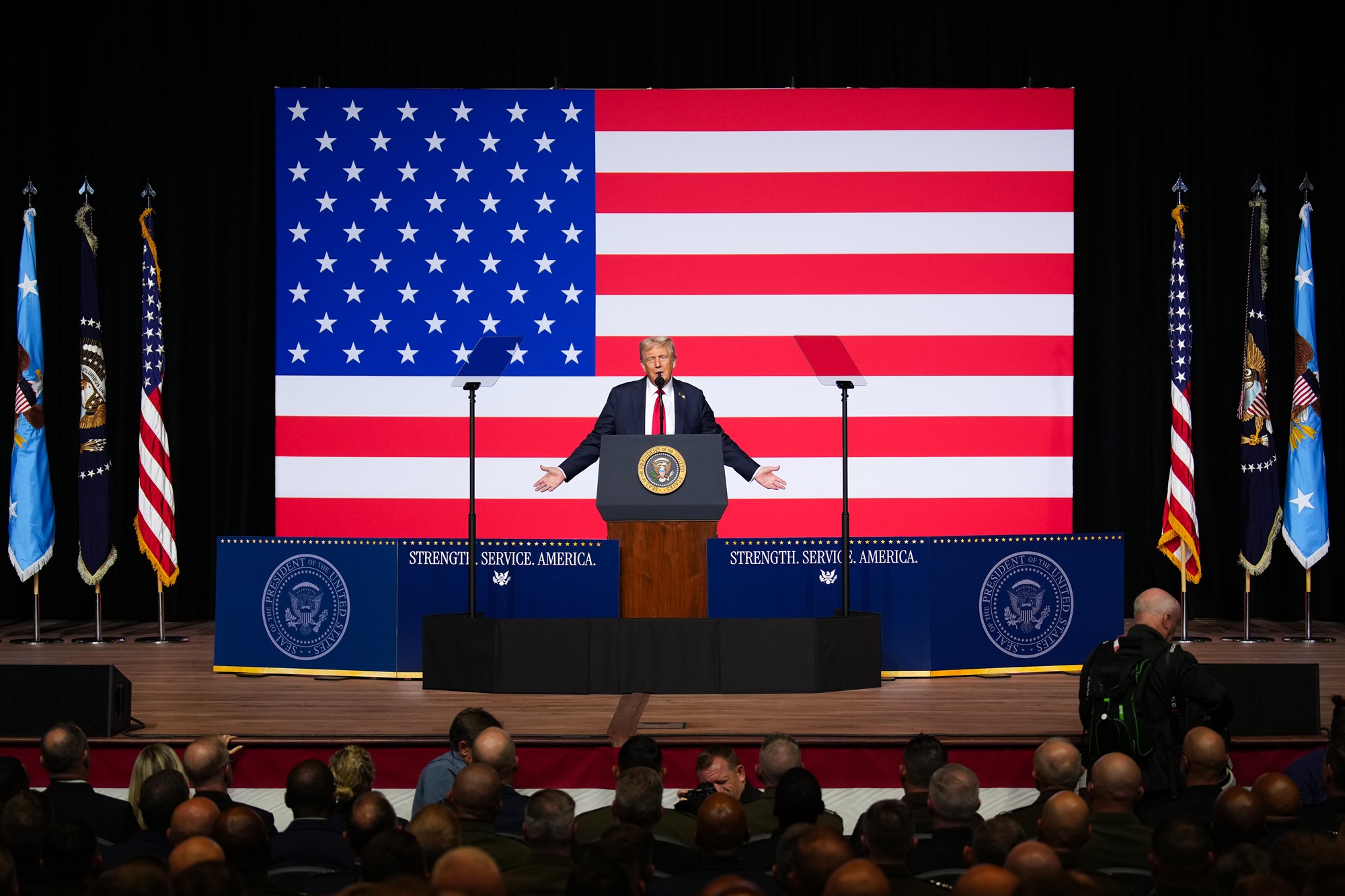- October 1, 2025
Trump declares war on America

In a dramatic and controversial address to senior military leaders on September 30, 2025, President Donald Trump framed his vision for domestic security in militaristic terms, characterizing major U.S. cities as battlegrounds and signaling a sweeping expansion of military authority on American soil.
“The Enemy From Within”
Trump’s remarks, delivered at Marine Corps Base Quantico, leaned hard into combative imagery. He repeatedly invoked the threat of an “enemy from within,” warning that “we have to handle it before it gets out of control.”
He specifically targeted major cities governed by Democratic leaders—San Francisco, New York, Los Angeles, Chicago—declaring them “very unsafe places” and promising that “we’re going to straighten them out one by one.”
Perhaps most provocatively, he proposed using these cities as “training grounds” for U.S. military and National Guard forces. His message: domestic policing and urban security would henceforth adopt a war footing.
Trump also claimed he had lifted prior constraints on force usage in U.S. cities and adopted a policy of “they spit, we hit”—a stark inversion of restraint.
Contradictions with Crime Trends
The Popular Information article emphasizes that many of Trump’s claims about urban disorder are at odds with empirical data on crime trends:
-
Los Angeles: In 2024 vs. 2023, murders fell ~14%, shootings ~19%.
-
In 2025 (Jan–July), property crime down ~15%, violent crime down ~12% (and murders down ~26%) according to the Real-Time Crime Index.
-
San Francisco: Murders were down ~32% in 2024; in 2025 (first seven months) murders ~20% lower, violent crime ~20% lower, property crime ~29% lower.
-
Portland: In first seven months of 2025, murders down ~51%, violent crime down ~16%, property crime ~4% lower.
-
Chicago: Violent crime dropped ~10% in 2024, murders ~7%. In 2025, violent crime down ~20%, murders down ~31%, property crime ~19%.
-
New York City: In 2024, overall crime down ~3%, murders ~5% lower. For 2025 (first seven months): murders down ~21%, violent crime ~3%, property crime ~4%.
These trends undercut the narrative of unchecked urban collapse that Trump used to justify the route he described.
Legal and Constitutional Limits
The article and additional sources raise serious questions about the legality of such domestic military operations:
-
The Posse Comitatus Act (1878) prohibits using the U.S. military in domestic law enforcement unless expressly authorized by Congress or the Constitution.
-
The Insurrection Act remains the key statutory exception—allowing troop deployment only when states request help or when insurrection blocks the enforcement of federal law.
-
While the president has authority to decide what is an “insurrection,” that determination can be reviewed if done in bad faith.
-
A federal judge recently judged that Trump’s use of federal troops in Los Angeles was unlawful—finding no insurrection or failure of civilian law enforcement to fulfill its duties.
-
Legal scholars warn that deploying military forces against American citizens for policing risks undermining the principle of civilian control over the military and opening the door to abuse.
Broader Implications & Responses
Normalization of Militarized Policing
By describing internal dissent, crime, or municipal governance as warfare, Trump’s rhetoric blurs lines between military force and civic authority. The framing echoes historical tactics used to suppress dissent and consolidate power.
Pushback from Cities & States
Several governors and mayors have reacted sharply. For instance, Illinois Governor J. B. Pritzker decried the proposals as “insane,” accusing Trump of adopting “tactics of Vladimir Putin.” Massachusetts leaders similarly criticized the speech as political theater.
Military Response and Culture Shift
Defense Secretary Pete Hegseth joined Trump at Quantico and backed the rhetoric by calling for stricter fitness, reformed disciplinary rules, and ending what he termed “woke” culture in the military. Some military leaders responded with silence or reserve, reinforcing norms that the armed forces remain apolitical.
Risk to Constitutional Order
If military interventions in cities become a precedent, the balance of power between the military, civilian governance, and individual rights could be profoundly altered. Critics warn of authoritarian drift and the erosion of civil liberties.

